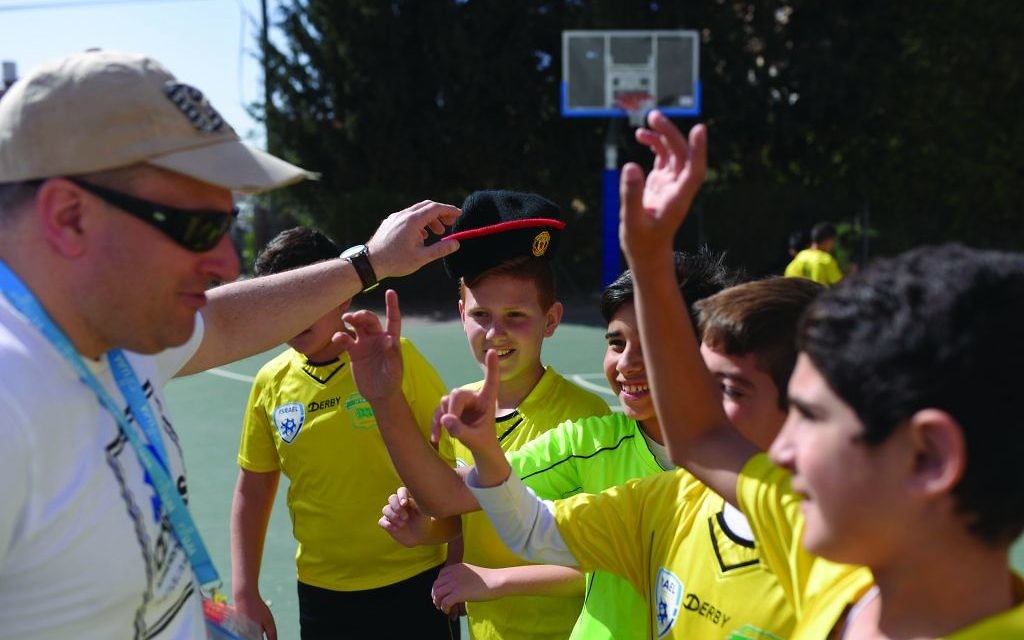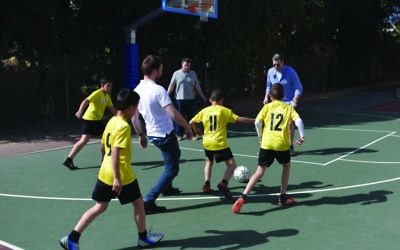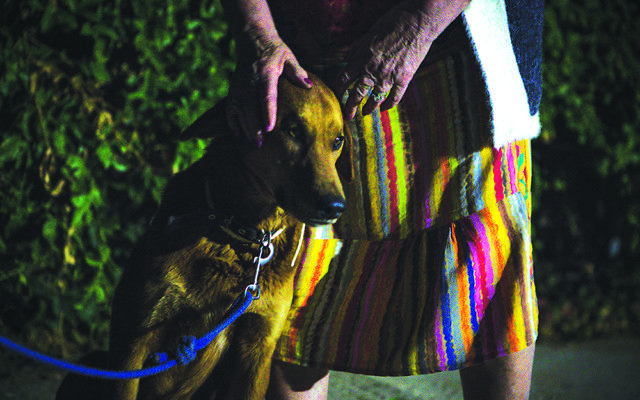Second chances: Giving kids in the Galil a new outlook on life
We visit a UJIA-funded kibbutz in the northern Galil that’s giving troubled youngsters a new outlook on life

On a kibbutz high in Israel’s northern Galil region, troubled Israeli teenagers show us how they’ve trained abandoned dogs so the dogs can find new homes. It’s a touching scene – kids and dogs – until they bring out a retriever named Ally, at which point it suddenly becomes hugely symbolic too.
Ally is scared stiff of us, a UJIA delegation touring projects funded by the charity. Just a pup, Ally was thrown into a sewer, where she would have died had someone not finally found her in October, six months ago.
Emaciated, she was sent up to Kibbutz Eshbal, which houses 40 at-risk youths from low socio-economic backgrounds, many of whom were ordered here by a judge as an alternative to jail. Ally didn’t eat for two weeks, and everyone feared the worst, until one day, out of the blue, she began copying another dog’s actions while it was being instructed nearby. It was a huge moment for the whole team.
Get The Jewish News Daily Edition by email and never miss our top stories Free Sign Up
Progress was slow. For months, she wouldn’t even come out of her cage, and the teens had to feed her from behind; she was so terrified, they couldn’t risk eye contact. They worked with her throughout the winter months, giving her confidence, until finally, on this sunny afternoon, here she is on a lead in front of us, cowering, very unsure of herself, but able to.
Smack! The significance hit me: vulnerable teenagers helping vulnerable animals, both giving the other confidence and self-esteem, both learning, preparing for new lives.
The youngsters here comprise Jews, Arabs and Bedouin, which reflects the local population. British and American students come here in their gap years to teach English, working in local villages and urban areas where help is most needed. Israeli students come here too, and head for the Arab villages, working inside schools, running Hebrew lessons.
“It’s not only linguistics, but basic dialogue – how do you speak with a Jewish person,
because most don’t meet Jewish people on a person-to-person level,” says Gilad, who founded the kibbutz on the site of an old army base while he was in a youth movement.
“Education in the Arab villages is very poor,” he says, “so we also have after-school activities, clubs, seminars, we take them on hikes, we let Arab and Jewish groups meet each other. Dialogue can create things”.
He sees Kibbutz Eshbal as a “co-existence centre, to create a bridge that will allow Israel to be both a Jewish and democratic state,” adding: “There are moments in every Jew’s life when he thinks about doing something for himself and for the nation.”
Nearby, at Gordon School in the Western Galil, Jewish and Arab children play football
together as part of the Equaliser Programme, which UJIA also funds. This is a poor region, organisers explain, where football can be a common language. “Often the kids have nothing to do after school, so they’re making trouble,” says Iran, the project founder. “And you know, as kids, if you look for trouble, you usually find it.”
With support from Israel’s Ministry of Education and the British Embassy (ambassador David Quarrey joins us for a kickabout), Iran began organising after-school football training, with monthly tournaments for Jewish and Arab children aged 10 to 12 (grades 4 to 6) who live in disadvantaged communities.
“There was no existing framework for kids’ football,” says Iran. “And what there was,
parents couldn’t afford.”
It followed a simple formula, he says, each school choosing a team of youngsters who would benefit most from the programme.
It soon expanded beyond the pitch, with children taught organisational skills, and how to set personal goals. Volunteers – mostly young Jewish students in their early 20s – began offering extra tuition in maths, Hebrew and English. But football remains the core, says Iran, in part because it is brilliant at breaking down barriers.
“When a Jewish kid sees that an Arab kid wants to win, like him, or cries when he loses, like him, they realise that the kid they’re shaking hands with at the end doesn’t actually want to kill them,” he says. “Same goes for the Arab kid. They accept each other.”
Equaliser and Eshbal are but two of the projects UJIA funds across the region. We saw the same cross-communal commitment at Darca Danciger School and Tel-Hai College in Kiryat Shmona, Israel’s northern-most town, and at the Academic College and Faculty of Medicine in Zfat. As a non-Jew, I was struck by this untold story: a Jewish charity pumping money into the education not only of Israeli Jews, but of Christians, Arabs, Druze, Circassians and Bedouin.
Often, it is more than just an educational leg-up. Karmiel Youth Village, another UJIA-funded project, provides homes and families for 200 vulnerable children whose homes had seen chronic alcohol, drug and/or mental health problems. “These kids need to be removed from harm’s way,” explains a foster mother, as her husband prepares a meal (“it’s International Women’s Day, so I have a day off!”)
Here, the foster children live in family units, surrounded by an army of social workers, child psychologists, therapists and university volunteers to help with their rehabilitation. When we visit, walls and kitchens come second to the happy children playing all around us.
They’re too young to realise, but they now have a future, and – just like Ally – can look forward to a better life as a result.

Thank you for helping to make Jewish News the leading source of news and opinion for the UK Jewish community. Today we're asking for your invaluable help to continue putting our community first in everything we do.
For as little as £5 a month you can help sustain the vital work we do in celebrating and standing up for Jewish life in Britain.
Jewish News holds our community together and keeps us connected. Like a synagogue, it’s where people turn to feel part of something bigger. It also proudly shows the rest of Britain the vibrancy and rich culture of modern Jewish life.
You can make a quick and easy one-off or monthly contribution of £5, £10, £20 or any other sum you’re comfortable with.
100% of your donation will help us continue celebrating our community, in all its dynamic diversity...
Engaging
Being a community platform means so much more than producing a newspaper and website. One of our proudest roles is media partnering with our invaluable charities to amplify the outstanding work they do to help us all.
Celebrating
There’s no shortage of oys in the world but Jewish News takes every opportunity to celebrate the joys too, through projects like Night of Heroes, 40 Under 40 and other compelling countdowns that make the community kvell with pride.
Pioneering
In the first collaboration between media outlets from different faiths, Jewish News worked with British Muslim TV and Church Times to produce a list of young activists leading the way on interfaith understanding.
Campaigning
Royal Mail issued a stamp honouring Holocaust hero Sir Nicholas Winton after a Jewish News campaign attracted more than 100,000 backers. Jewish Newsalso produces special editions of the paper highlighting pressing issues including mental health and Holocaust remembrance.
Easy access
In an age when news is readily accessible, Jewish News provides high-quality content free online and offline, removing any financial barriers to connecting people.
Voice of our community to wider society
The Jewish News team regularly appears on TV, radio and on the pages of the national press to comment on stories about the Jewish community. Easy access to the paper on the streets of London also means Jewish News provides an invaluable window into the community for the country at large.
We hope you agree all this is worth preserving.
-
By Brigit Grant
-
By Laurent Vaughan - Senior Associate (Bishop & Sewell Solicitors)
-
By Laurent Vaughan - Senior Associate (Bishop & Sewell Solicitors)
-
By Laurent Vaughan - Senior Associate (Bishop & Sewell Solicitors)
-
By Laurent Vaughan - Senior Associate (Bishop & Sewell Solicitors)























